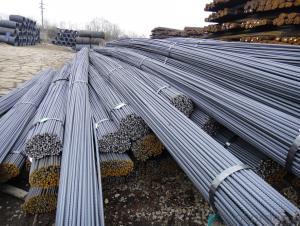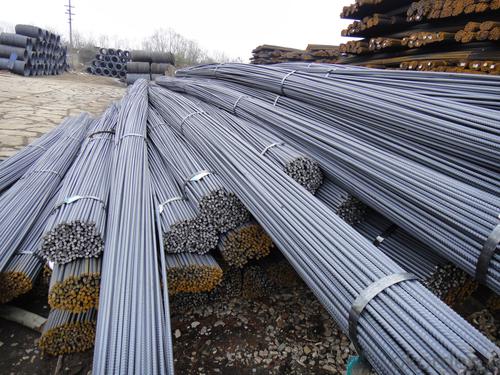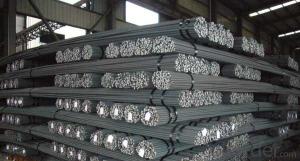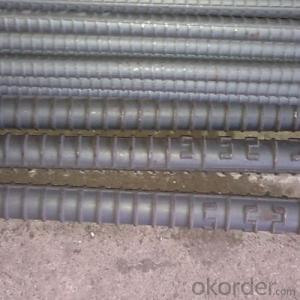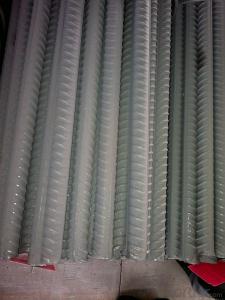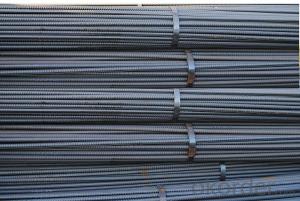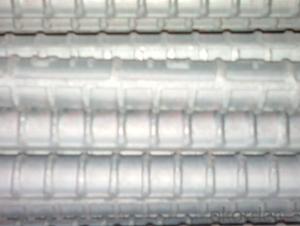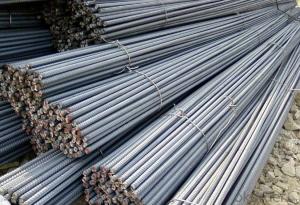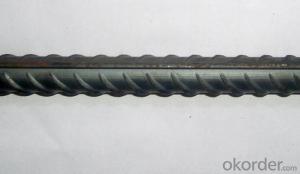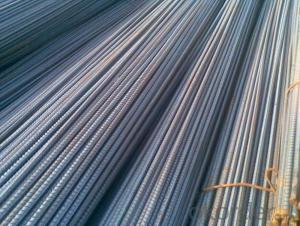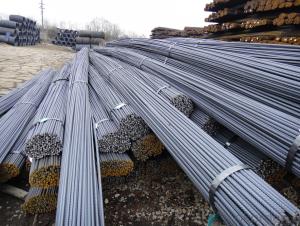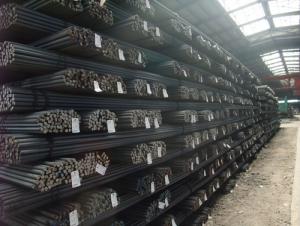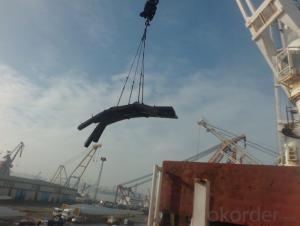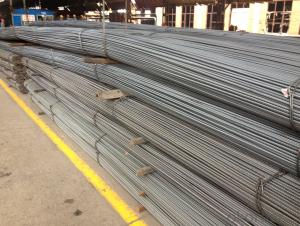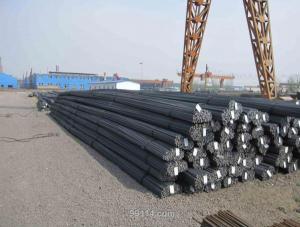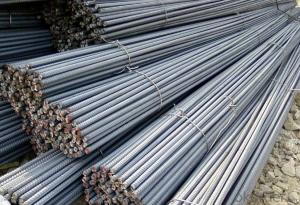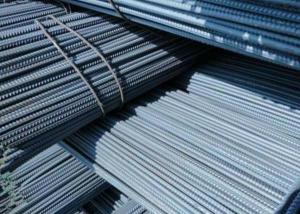Hot Rolled Carbon Steel Rebar 28mm with High Quality
- Loading Port:
- China Main Port
- Payment Terms:
- TT or LC
- Min Order Qty:
- 25 m.t.
- Supply Capability:
- 10000 m.t./month
OKorder Service Pledge
OKorder Financial Service
You Might Also Like
Product Description:
OKorder is offering Hot Rolled Carbon Steel Rebar 28mm with High Quality at great prices with worldwide shipping. Our supplier is a world-class manufacturer of steel, with our products utilized the world over. OKorder annually supplies products to European, North American and Asian markets. We provide quotations within 24 hours of receiving an inquiry and guarantee competitive prices.
Product Applications:
Hot Rolled Carbon Steel Rebar 28mm with High Quality is widely used in buildings, bridges, roads and other engineering construction. Big to highways, railways, bridges, culverts, tunnels, public facilities such as flood control, dam, small to housing construction, beam, column, wall and the foundation of the plate, deformed bar is an integral structure material. With the development of world economy and the vigorous development of infrastructure construction, real estate, the demand for deformed bar will be larger and larger..
Product Advantages:
OKorder's Hot Rolled Carbon Steel Rebar 28mm with High Quality are durable, strong.packed and suitable for construction
Main Product Features:
· Premium quality
· Prompt delivery & seaworthy packing (30 days after receiving deposit)
· Can be recycled and reused
· Mill test certification
· Professional Service
· Competitive pricing
Product Specifications:
Manufacture: Hot rolled
Grade: HRB335 HRB400 BS4449 Grade460 ASTM Grade40 Grade60
Certificates: ISO, SGS, BV, CIQ
Length:6m 8m 9m 12m
Packaging: Export packing, packed by coil
FAQ:
Q1: Why buy Materials & Equipment from OKorder.com?
A1: All products offered byOKorder.com are carefully selected from China's most reliable manufacturing enterprises. Through its ISO certifications, OKorder.com adheres to the highest standards and a commitment to supply chain safety and customer satisfaction.
Q2: How do we guarantee the quality of our products?
A2: We have established an advanced quality management system which conducts strict quality tests at every step, from raw materials to the final product. At the same time, we provide extensive follow-up service assurances as required.
Q3: How soon can we receive the product after purchase?
A3: Within three days of placing an order, we will begin production. The specific shipping date is dependent upon international and government factors, but is typically 7 to 10 workdays.
Q4: How many tons per bundle?
A4: Around 2-3tons
Q5: How to avoid the rust after deliver the goods to the loading port?
A5: We will keep the goods at the port covered with water-proof material
Q6: What is the chemical composition and physical properties of HRB400?
A6:
Grade | Technical data of the original chemical composition (%) | ||||||
C | Mn | Si | S | P | V | ||
HRB400 | ≤0.25 | ≤1.60 | ≤0.80 | ≤0.045 | ≤0.045 | 0.04-0.12 | |
Physical capability | |||||||
Yield Strength (N/cm²) | Tensile Strength (N/cm²) | Elongation (%) | |||||
≥400 | ≥570 | ≥14 | |||||
Images:
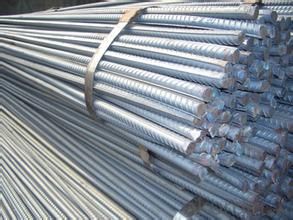
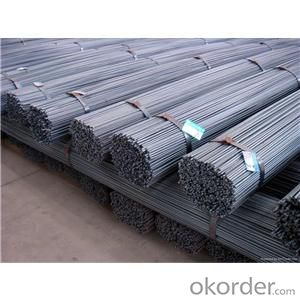
- Q: How do steel rebars contribute to the fire resistance of a structure?
- Steel rebars contribute to the fire resistance of a structure by providing strength and stability to the building's concrete components. In the event of a fire, the rebars help prevent the concrete from cracking or collapsing under high temperatures. The steel has a high melting point, which allows it to maintain its structural integrity even in intense heat. This prolongs the time before the structure reaches its critical failure point, giving occupants more time to evacuate and firefighters more time to control the fire.
- Q: How do steel rebars resist buckling in concrete structures?
- Due to their high strength and stiffness, steel rebars are able to resist buckling in concrete structures. When compressive forces are applied to concrete, it tends to expand laterally, leading to the formation of cracks. These cracks weaken the concrete and reduce its load-bearing capacity. However, by incorporating steel rebars into the concrete, the structure's tensile strength is greatly increased. Steel rebars, composed of strong steel alloys, possess exceptional tensile strength. When concrete is subjected to compressive forces, the rebars bear the tensile stresses within the structure. Acting as reinforcement, the rebars prevent the concrete from cracking and provide additional support to the structure. Furthermore, the presence of rebars aids in distributing the compressive forces more evenly throughout the concrete. This ensures that the load is spread over a larger area, reducing the likelihood of localized buckling. The rebars effectively enhance the overall stiffness of the structure, making it more resistant to buckling and deformation. In addition, the bond between the steel rebars and the surrounding concrete is crucial in resisting buckling. The rough surface of the rebars promotes enhanced adhesion with the concrete, creating a strong bond. This bond transfers the applied load from the concrete to the rebars, preventing the concrete from buckling and maintaining the structural integrity of the system. Overall, the combination of high tensile strength, improved load distribution, and strong bond with the concrete enables steel rebars to resist buckling in concrete structures. The presence of rebars significantly enhances the structural performance, ensuring the safety and durability of the concrete structure.
- Q: What is the effect of welding on the properties of steel rebars?
- The effect of welding on the properties of steel rebars can vary depending on several factors. Firstly, welding can introduce heat into the rebars, which may cause localized changes in the material's microstructure. This can lead to changes in the rebars' mechanical properties, such as hardness and strength. The heat-affected zone (HAZ) near the weld can experience changes in grain structure, which may affect the rebars' ability to withstand tension, compression, or bending forces. Secondly, the welding process can introduce residual stresses into the rebars. This occurs due to the expansion and contraction of the material during the heating and cooling phases of welding. Residual stresses can potentially affect the rebars' performance under load, as they can increase the susceptibility to cracking or failure. Furthermore, welding can also introduce defects such as porosity, inclusions, or lack of fusion if not performed properly. These defects can weaken the rebars and reduce their load-bearing capacity. Additionally, the presence of welding consumables and fluxes can introduce impurities into the rebars, which may affect their corrosion resistance. Overall, while welding can be an effective method for joining steel rebars, it is crucial to consider the potential effects on their properties. Proper welding techniques, including preheating, controlling heat input, and post-weld heat treatment, can help minimize these effects and ensure that the rebars maintain their desired mechanical and structural properties. Regular inspections and testing of welded rebars are also important to ensure the integrity and safety of the overall structure.
- Q: Can steel rebars be used in structures with curved or irregular shapes?
- Structures with curved or irregular shapes can indeed utilize steel rebars. Owing to their remarkable flexibility, steel rebars can be easily bent or molded to accommodate the desired structure form. They find extensive application in reinforced concrete structures, where architectural or structural design calls for curved or irregular shapes. Typically, the rebars are bent or trimmed as per the required configuration and then firmly fastened in position to impart robustness and reinforcement to the structure. Consequently, this facilitates the construction of intricate structures with sophisticated designs, all while guaranteeing their steadfast structural integrity and longevity.
- Q: What are the common types of steel rebars used in residential construction?
- The common types of steel rebars used in residential construction are typically Grade 40, Grade 60, and Grade 75. These rebars vary in terms of their yield strength and are chosen based on the specific structural requirements of the project.
- Q: Can steel rebars be used in the construction of industrial facilities?
- Yes, steel rebars can definitely be used in the construction of industrial facilities. Steel rebars provide excellent strength and durability, making them ideal for reinforcing concrete structures in industrial settings where heavy loads and high stress conditions are common. Additionally, steel rebars are resistant to corrosion, which is crucial in industrial environments that may be exposed to moisture or chemicals. Overall, steel rebars are a popular and reliable choice for reinforcing industrial facilities.
- Q: What is the process of reinforcing concrete columns with steel rebars?
- The process of reinforcing concrete columns with steel rebars involves several steps to ensure structural integrity and strength. Firstly, the design and specifications of the concrete column are determined based on the required load-bearing capacity and other structural considerations. This includes determining the size, shape, and location of the rebars within the column. Next, the concrete formwork is prepared, which involves constructing a temporary mold or framework in the desired shape and dimensions of the column. This formwork provides support and containment for the concrete during pouring and curing. Once the formwork is in place, the steel rebars are carefully positioned and secured within the formwork. The rebars are typically arranged in a specific pattern to provide maximum reinforcement and strength. This pattern may include vertical bars along the length of the column, as well as horizontal bars that wrap around the vertical bars. The rebars are usually tied together at intersections using wire or other fasteners to maintain their position and prevent movement during the concrete pouring process. This ensures that the rebars are properly embedded within the concrete and will effectively reinforce the column. After the rebars are securely in place, the concrete is poured into the formwork. The concrete mixture is carefully placed and consolidated to ensure it completely surrounds and encases the rebars. This helps to bond the concrete and steel together, creating a composite material that is stronger and more resistant to cracking and deformation. Once the concrete is poured, it is left to cure and harden. This typically involves a period of several days or weeks, during which the concrete gains strength and durability. Proper curing is crucial to ensure the rebars and concrete bond together effectively and the column achieves its intended load-bearing capacity. After the concrete has fully cured, the formwork is removed, revealing the reinforced concrete column. The rebars should be fully embedded within the concrete, providing additional strength and support to withstand the applied loads. Overall, the process of reinforcing concrete columns with steel rebars requires careful planning, positioning, and securing of the rebars within the formwork, followed by the pouring, curing, and removal of the formwork. This process ensures the resulting reinforced concrete column is structurally sound and capable of withstanding the intended loads and forces.
- Q: Can steel rebars be used in aggressive chemical environments?
- To some extent, aggressive chemical environments can tolerate the use of steel rebars. However, the severity and characteristics of the chemicals present may compromise their performance. In most construction applications, steel rebars are generally resistant to mild to moderate chemical exposures. Nonetheless, in highly aggressive chemical environments with prolonged and intense exposure to corrosive substances like acids, alkalis, or salts, steel rebars may corrode and deteriorate over time. In such instances, alternative materials such as stainless steel rebars or epoxy-coated rebars may be more suitable, as they offer enhanced resistance to corrosion in aggressive chemical environments. It is crucial to consider the specific conditions of the chemical environment and seek guidance from experts or structural engineers to determine the most appropriate rebar material for the given situation. Regular inspections and maintenance are also necessary to monitor the condition of steel rebars and ensure their durability in aggressive chemical environments.
- Q: How do steel rebars affect the overall maintenance requirements of concrete structures?
- The overall maintenance requirements of concrete structures are greatly influenced by steel rebars. These reinforcing bars serve a critical role in improving the strength and longevity of concrete by providing tensile strength and preventing cracks. When steel rebars are added to concrete, the structure becomes better equipped to withstand external forces it may encounter throughout its lifespan. One primary way in which steel rebars impact maintenance requirements is by decreasing the likelihood of cracks in concrete structures. While concrete is strong in compression, it is weak in tension. When exposed to tensile forces such as loads or temperature changes, concrete tends to crack. However, incorporating steel rebars within the concrete helps minimize or even prevent these cracks. This is because the steel rebars absorb the tensile forces, allowing the concrete to remain intact. As a result, structures that remain intact require less maintenance. Additionally, steel rebars also enhance the overall strength of concrete structures, making them more resistant to external forces. This increased strength reduces the risk of structural failure, thereby reducing maintenance requirements in terms of repairs or replacements. Furthermore, the use of steel rebars can extend the lifespan of concrete structures as they provide the necessary reinforcement to withstand the test of time. However, it is important to note that steel rebars can be susceptible to corrosion over time, which can impact the maintenance requirements of concrete structures. When steel rebars corrode, they expand, leading to cracks and spalling in the concrete. Various factors such as moisture exposure, chloride ions, or carbonation can accelerate this corrosion. Therefore, regular inspections and maintenance measures, such as protective coatings or cathodic protection, must be implemented to prevent or manage the corrosion of steel rebars. In conclusion, steel rebars have a significant impact on the overall maintenance requirements of concrete structures. They improve the strength, durability, and resistance of concrete, reducing the occurrence of cracks and structural failures. However, proper maintenance and protection against corrosion are essential to ensure the continued effectiveness of steel rebars, ultimately contributing to the longevity and low maintenance needs of concrete structures.
- Q: What is the effect of steel rebars on the seismic performance of a structure?
- Steel rebars have a significant positive effect on the seismic performance of a structure. By reinforcing the concrete, rebars enhance the strength and ductility of the building, allowing it to better withstand seismic forces. This reinforcement helps prevent structural failure, reduces the risk of collapse, and improves overall stability during an earthquake.
Send your message to us
Hot Rolled Carbon Steel Rebar 28mm with High Quality
- Loading Port:
- China Main Port
- Payment Terms:
- TT or LC
- Min Order Qty:
- 25 m.t.
- Supply Capability:
- 10000 m.t./month
OKorder Service Pledge
OKorder Financial Service
Similar products
Hot products
Hot Searches
Related keywords
